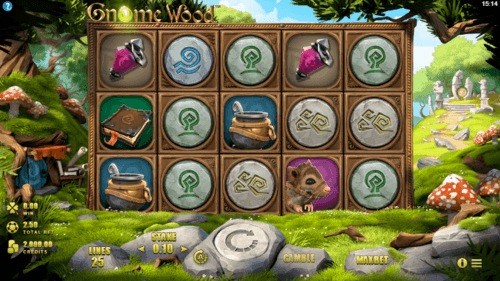Gnome Slot

Gnome is a 5 reel and 9 pay-line virtual pokie. With the retro graphics and music in the background which, bear in mind, can’t be turned off, it provides maximum fun to all types of gamblers, low-staking players and also high rollers. The Gnome slot machine game is developed by the Igrosoft software manufacturer. What is interesting about. Reign of Gnomes Slots Play Now Lovers of fantasy novels and movies may find Reign of Gnomes to be a slot title that fits their interests While the came is obviously inspired by a best-shelling fantasy series of books and an insanely popular television show, the use of gnomes makes this slot title light-hearted compared to the gloom of the. Gnome Wood’s theme is a simple one, relying on a forest where a gnome lives and showing us the marvels that exist there. Thanks to a gorgeous design, the slot machine ends up being quite fun, and the cute gnome character that’s in the main role has a big contribution to that. There are a very good mix of standard casino slots and progressive jackpot awarding slot machines too and if you are eager to learn how often are progressive jackpots won well those attached to Igrosoft slot machines do tend to get won by lucky players fairly regularly it does have to be said. When playing Igrosoft designed slots like the Gnome slot you will be able to pick from a range of.


Slots are type-safe representations of callback methods and functions. More...
Classes | |
| class | sigc::slot< T_return(T_arg...)> |
| Converts an arbitrary functor to a unified type which is opaque. More... | |
| class | sigc::slot_base |
| Base type for slots. More... | |
Detailed Description
Slots are type-safe representations of callback methods and functions.
A slot can be constructed from any function object or function, regardless of whether it is a global function, a member method, static, or virtual.
Use the sigc::mem_fun() or sigc::ptr_fun() template functions to get a sigc::slot, like so:
or
or, in gtkmm,
The compiler will complain if SomeClass::somemethod, etc. have the wrong signature.
You can also pass slots as method parameters where you might normally pass a function pointer.
Gnome Wood Slot Free Play
See sigc::mem_fun() about deriving from sigc::trackable to prevent member methods from being called after the instance has been destroyed.
Gnome Clothes Patterns
sigc::mem_fun() and sigc::ptr_fun() return functors, but those functors are not slots.
is not equivalent to
If you don't explicitly use a sigc::slot then the slot could call a method on an instance after it has been destroyed even if the method is in a class that derives from sigc::trackable.

A C++11 lambda expression is a functor (function object). It is automatically wrapped in a slot, if it is connected to a signal.
Gnome Slot Game Free
Gnome Slot Free
If you connect a C++11 lambda expression or a std::function<> instance to a signal or assign it to a slot, if your functor contains references to sigc::trackable derived objects, those objects will not be tracked, unless you also use sigc::track_obj().